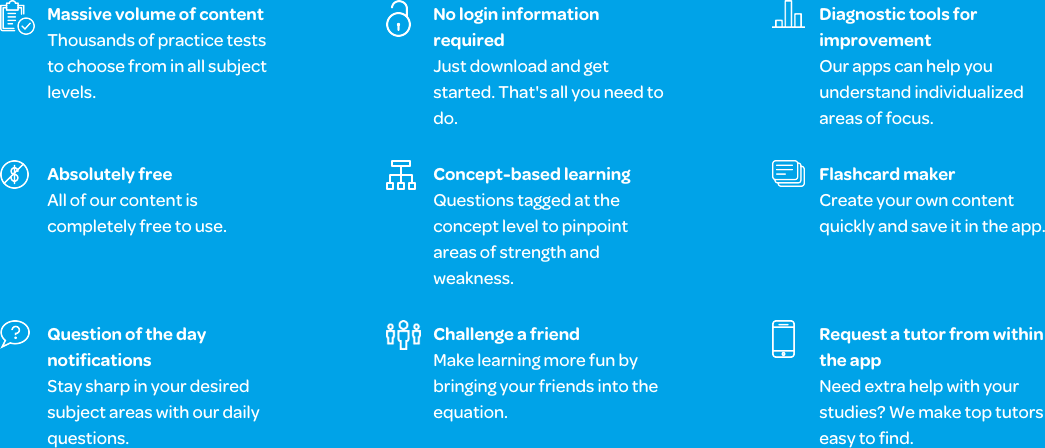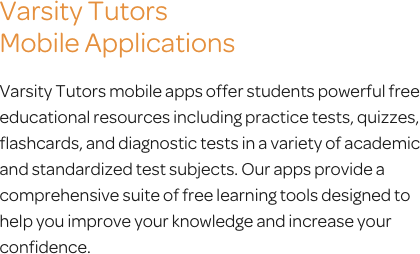The Varsity Tutors AP English Language Mobile App
A student's preparation for the AP English Language exam involves learning the material covered and practicing with the test format. Students have an hour to answer the multiple-choice questions, and two hours to write three essays. The multiple-choice section is worth 45 percent of the exam score, and the essays account for the remaining 55 percent. The free Varsity Tutors AP English Language app for Android, iPhone, and iPad is intuitively designed to enable students to practice being analytical and argumentative. It is available on iTunes and at the Google Play Store.
One of the benefits of the app is that it enables students to practice with literary devices and how authors use them. The content helps students understand how mood is conveyed through word choice and contextual meanings in a given text. With the flashcard tool, students can get quick reviews of concepts such as style choices, personification, paradoxes, and parallelism. They can also add audio, photographs, and text to their own flashcards using the built-in tools.
Experts have written and contributed hundreds of questions to the full-length practice tests. These timed tests simulate the environment students encounter while taking the real exam, and provide scores and feedback similar to that of the actual standardized test. Students can assess their skill level by performance area, or get quick refreshers with the Question of the Day, which is especially useful on a busy day.
With the tools available through the app, students can fit a little practice into each day so they won’t have to cram right before the test. Cramming is typically ineffective, because it is difficult to absorb a great deal of information at once. Cramming reduces the likelihood that one will be able to recall the information during the exam.
The app provides all of the tools necessary to practice AP English Language concepts anytime, anyplace. Students can use the practice tests to assess their readiness, or uncover the topics that need more review. The results of the tests quickly point these out. It’s a great benefit, since students can then spend more time on any areas of difficulty in order to maximize their chances of mastering them before the test. Plus, students will encounter prompts, passages, and analyses similar to those that have been included on past tests. Students can select a concept-specific test or take a more general practice test, with questions selected from a pool of topics likely to be on the exam.
Statistical analyses following the questions and tests are similar to those on the actual AP English Language and Composition exam. Students can then assess their performance and compare their results to that of others who have completed the test. The thorough explanations provided can help boost one’s knowledge of the topic.
If a student’s classroom instruction and study sessions need some support, the Varsity Tutors AP English Language App can help can shore up any weak areas. Available from the Google Play Store and iTunes, the Varsity Tutors AP English Language app for Android, iPhone, and iPad lets students study on the go.
66 mobile apps to choose from for your tutoring needs.

Learn More
If you are interested in pursuing a career that requires excellent command of the English language, you might want to consider taking the AP English Language and Composition course offered by The College Board. In this course, you will study the art of persuasive speeches and rhetoric writing while working towards college credits or improved placement.
This program is designed more for students who are interested in studying analytical writing. If you are interested in studying English that relates to literary topics, you are encouraged to choose AP English Literature and Composition instead.
The AP English Language course is designed to help you improve your writing skills by teaching you how to successfully formulate a compelling argument. Essential components of the program include critical thinking, data analysis, and making use of rhetorical devices. As you navigate through the course, you will explore a variety of nonfiction works from a diverse range of authors and periods.
The end of course exam is divided into two sections. The first section consists of approximately 55 multiple-choice questions that you will have one hour to complete. These questions are designed to evaluate your critical reading and analysis skills. For this portion of the test, you will be questioned on passages that you are required to read.
The second portion of the exam consists of a writing component. You are given three free-response questions that you have two hours to answer. In addition to the two hours, you are given an extra 15 minutes to read the passages and instructions. This section is designed to evaluate your ability to compose a thoughtful analysis or argument. While you are required to cite the provided sources, this writing must consist of your own ideas.
When studying AP English Language, you will learn a number of strategies to improve thinking, writing, and reading skills. These instructional strategies are designed to help you learn how to evaluate your own thoughts and ideas, as well as evaluate the ideas and opinions from external sources. These strategies are comprised of the following methods: the Socratic seminar, debate, jigsaw, fishbowl, shared inquiry, and discussion group.
When using the Socratic seminar, you will be prompted to ask a number of clarifying questions that challenge assumptions, question facts, and critically examine evidence. The debate strategy is designed to encourage you to present evidence supporting your claim while challenging opposing viewpoints.
The other strategies do not focus on dispelling arguments, but rather discussing important information. The jigsaw method, for example, is appropriate when working together as a group, as it requires group members to explain difficult concepts in a simplified manner that one would understand without having prior knowledge of the topic. When using the fishbowl method, you are able to be both the listener and the presenter. In this method, every student is given a specific point that must be presented to the group. The shared inquiry and discussion group methods are both designed to have you interact with others and discuss a number of points related to your argument. The difference is that shared inquiry is generally conducted in a one-on-one setting, while discussions happen in small groups where each member has a specific role.
Another important component of the AP English Language course is rhetorical reading. Here, you are required to become a critical reader who is able to analyze and dissect a reading passage. To successfully master this skill, you must have a strong foundation in reading comprehension and be able to look at the deeper meaning in how language is used in specific passages.
In order to improve your persuasive skills, you will be required to become acquainted with the philosophy behind rhetorical devices. One of these philosophies is the “Theory of Discourse” by James Kinneavy. This theory will teach you about Kinneavy’s rhetorical triangle, and how culture and historical factors influence all rhetorical actions. When exploring this aspect, you will learn about his four purposes of discourse: informative purpose, persuasive purpose, expressive purpose, and literary purpose.
Another important theory in AP English is the Aristotelian rhetorical analysis, which is named after the legendary philosopher, Aristotle. In this theory, you will learn that how you say something is just as important as what you actually say. In other words, presentation is just as important as fact. In this theory, you will learn Aristotle’s five important principles: style, invention, arrangement, memory, and delivery.
While AP English Language does not focus on famous literary works, you are expected to complete a number of reading assignments throughout the course. These texts include works on philosophy, history, culture, and politics. You will be required to read controversial works and formulate informed opinions, as well as explore trade books, general readers, speeches, and writings surrounding current events.
Because grammar and style are important aspects of the English language, you will learn how to utilize these tools to make compelling arguments. Certain vocabulary words and sentence structures can create subtle nuances. This includes idiomatic expressions that change meaning dependent on social context, structuring your sentences in a way that is easy for listeners to follow, and deciding when it is appropriate to use the active and passive voices.
While the nature of this course is to develop a solid foundation in the formalities associated with rhetoric, you will also be given the opportunity to write informally in journal entries and as part of various exercises. This is seen as an important way to help you explore a number of writing techniques and become comfortable with your own writing skills.
By completing this course, you will have developed the necessary skills needed to research and compose compelling arguments. Additionally, you will have learned to properly cite articles using formal styles, like those from The Chicago Manual of Style or the Modern Language Association. The purpose of AP English Language is not only to improve persuasive writing and speaking skills, but to help you create a wide-ranging lexicon that can empower you for any situation.
In order to successfully complete this course, you will also be required to maintain a student portfolio that has your writings, including collaborative pieces, journal entries, and various exercises. This portfolio will routinely be critiqued and evaluated, and should provide you with constructive feedback.




